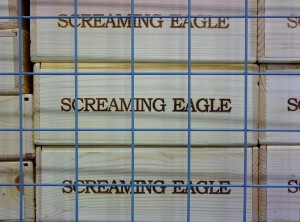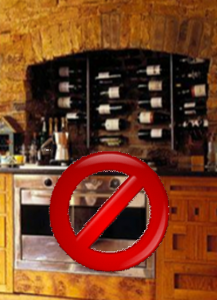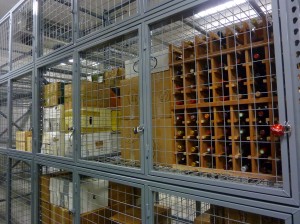SOME DOS AND DON’TS FOR WINE COLLECTORS–PART II
In this 3-part series we examine the critical phases of enjoying wine: buying, storing, and serving. In Part I we examined Buying Wine in the Digital Age. In Part II we look at storing collectible wine, from ensuring the wine you buy is sound to keeping wine healthy for years while it reaches full potential.
Part II: Storage is Important…Really
Whether you’re collecting wine to drink or as an investment, you need to take the same precautions to make sure your bottles stays healthy. It isn’t rocket science but this is no place to cut corners.
Wine Provenance: Once you go down the path of wine collecting with an eye to aging wines, there are a few basic principles you need to adhere to. But before we get to storage dos and don’ts, let’s back up to see how you can protect against buying faulty wines in the first place.
We briefly touched on the concept of provenance in Part I of this series. It simply refers to where and how the wine was stored from the time it left the winery or bottling facility to when you bought it. You may have a perfect cellar with pris tine storage conditions, but if the wine you bought was abused during transportation or storage before you got it your perfect wine cellar will be of little help. Let’s look at how you can minimize your risk:
tine storage conditions, but if the wine you bought was abused during transportation or storage before you got it your perfect wine cellar will be of little help. Let’s look at how you can minimize your risk:
- Deal with reputable retailers: Finding out how a retailer stores his or her wines before you buy them isn’t always easy; however don’t hesitate to ask to see where they store on-site wine to make sure the temperature stays within acceptable ranges. If you’re buying wine online make sure the company only ships wines when the weather isn’t too hot or too cold. Regard it as a red flag if they don’t make their shipping policy clear on their website. The internet can help here; go online to wine websites like winebezerkers.com and ask fellow wine lovers if they have had any bad experiences with the online wine seller you are thinking of buying from.
- Do due diligence on private collections: Private collections can be a great resource to find older vintages of hard-to-find wines, however you should do whatever you can to make sure the wines have been stored properly. This can get murky as the wines may have changed hands several times before they got to you and tracing provenance back to the wine’s origins can require some serious sleuthing. Also fake wines have become a major issue with wine auction houses and some recent, high profile shenanigans involving fraudulent rare wines have made verifiable provenance a critical issue for collectors. Having been burned, the reputable auction houses now go to great length to ensure authenticity of the wines they are putting on the block. But if you are dealing one-on-one with a private collector or their agent you are on your own. Ask for paperwork showing where and when the wine was bought and, if possible, go to the seller’s storage facility or private cellar to make sure everything is cool (literally). Also sometimes local retailers buy wines from private collections, so if you’re buying older collectibles make sure to do your homework on where the wine came from before handing over your credit card.
Storage do’s and don’ts: OK, you’ve bought your babies and now you need to make sure they stay healthy until they are ready for the table. A few basics will help you from committing “vinocide”:
- Avoid fluctuating temperature. A steady temperature—even if it is higher
 than the prescribed 55F that most collectors use as a benchmark—is the most critical factor in keeping your wine healthy. If you keep your wine at a steady 60F it may age faster than at 55F, but you won’t ruin it. On the other hand keeping wine in a house or apartment where temps swing from 75F to 65F on a daily basis will ruin your wine fairly quickly. And whatever you do keep your wine out of the kitchen unless it is in a wine fridge. Heat from the stove is like a gun to the head of fine wine.
than the prescribed 55F that most collectors use as a benchmark—is the most critical factor in keeping your wine healthy. If you keep your wine at a steady 60F it may age faster than at 55F, but you won’t ruin it. On the other hand keeping wine in a house or apartment where temps swing from 75F to 65F on a daily basis will ruin your wine fairly quickly. And whatever you do keep your wine out of the kitchen unless it is in a wine fridge. Heat from the stove is like a gun to the head of fine wine. - Avoid strong light and vibration…the laundry room is out.
- Store wines with corks on their side. Don’t want the cork drying out and letting excessive air in that will oxidize your beauties. BTW everything we have read indicates that this isn’t an issue with screwtops.
Heat is the enemy of wine, so be sure you have invested in reliable storage. If you’re storing wine at home invest in good equipment. This is no place to be penny wise and pound foolish. And if you want further proof on how heat affects wine, click here.
We know this sounds like a plug, but dedicated wine storage facilities like San Diego Wine Storage that have invested in commercial grade insulation and redundant refrigeration with monitored security systems can help you sleep at night and keep you from worrying about home wine cellar malfunctions or break-ins while you are out of town or on vacation.
Tips from the trade: Now that we have worked through the basics, here are a few tips that can make life easier for wine collectors who store wine at facilities like San Diego Wine Storage:
- If you are stacking cardboard wine cases three to four cases high, alternate the bottles neck to base within the cases. This will keep the boxes from compacting at the neck end.
- Consider installing bottle racks that will give you better access to your wines. You can keep the long-term agers in cases and use bottle racks for wines you want to drink in the near-term.
- Keep track of your wine. The biggest complaint we get from our members is that they have lost track of what they have and where it is. A simple Excel spreadsheet or good online database like CellarTracker™ can help you avoid the angst of not knowing which wines are in danger of going over the hill. Many wine storage facilities like SDWS provide wine cataloging, valuation, and drinking windows as a paid service to their customers.
- Store the bulk of your wine at a dedicated wine storage facility like San Diego Wine Storage, but maintain a reliable 50-100 bottle wine fridge at home to keep your near-term drinkers close at hand. But remember that most personal wine fridges vibrate so they aren’t recommended for long-term storage.
Next: The drinking ritual—from soup to nuts



